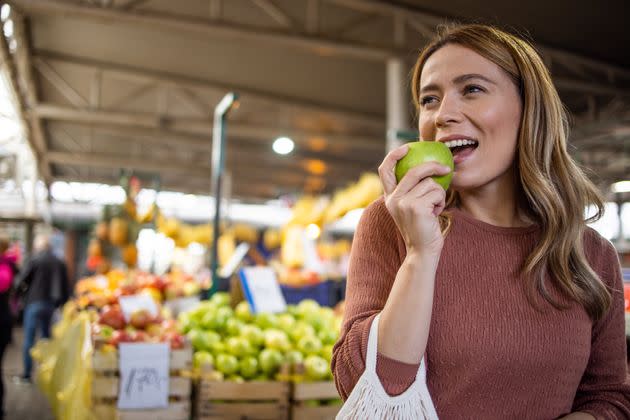Is It Rude To Snack While Grocery Shopping? Supermarket Employees Have Thoughts.

Nutrition experts caution against grocery shopping when you’re hungry, but that advice relates to making healthy food choices. It has little to do with a different, more polarizing issue: snacking in the supermarket.
As some people wander the aisles, they might grab a small bag of pretzels and start munching. Or maybe they eat a handful or two of grapes, just to “test the ripeness,” of course. Some do it, and others find it unfathomable.
But as long as you intend to pay for the food, snacking while grocery shopping is no biggie, right? Well, it depends on who you ask.
Shoppers on X (formerly known as Twitter) find the common practice “wildly irritating” and, based on their use of an “Abbott Elementary” meme, cringe-inducing as well. Under a video that shows TikToker @cecilybauchmann handing a cashier an empty food container after eating in a store, commenters are divided. Some say it is “embarrassing” and “feels so illegal,” while others believe that it’s no problem if you eventually pay for them.
But grocery store employees themselves are here to provide clarity on the practice. I’Talia McCarthy, the general manager of Dill Pickle Food Co-Op in Chicago, has worked in grocery stores since 2007. She says it’s acceptable to munch on nonweighted items (like a carton of Goldfish or a box of cookies) if you pay for them before you leave. That means you generally won’t get flak for cracking open a bottle of pop and enjoying it as you stroll through the bread aisle, she said. However, foods that interfere with other shoppers’ experience, such as those with strong smells or those that create a sticky, crumby mess for employees to deal with later, shouldn’t be consumed in the store, she added.
From a legal standpoint, eating before you buy could be problematic. As private entities, grocery stores have the right to establish their own policies on consuming products prior to purchase, and if a store has a regulation against it, doing so could technically be considered theft, said C.L. Mike Schmidt, an attorney at Schmidt & Clark LLP.
“Until you’ve paid for an item, it still belongs to the store. It’s akin to using someone’s property without their permission,” he explained. “While this might seem trivial when it comes to a few grapes or a bottle of soda, the principle remains the same.”
That said, not all supermarkets have these policies or actively enforce them, Schmidt noted.

The best rule of thumb is to pay for your low-profile food or drink before you enjoy it, said Mary Mullally, the interim general manager of Hunger Mountain Co-Op in Montpelier, Vermont.
“You can get a ‘paid’ sticker from the cashier and continue to eat and shop — that’s totally fine,” she said. Just make sure to clean up after yourself and throw away any trash; don’t place your wrapper on a random shelf or hand it to an employee and expect them to toss it, she added.
It’s particularly important to pay upfront for weighted goods, such as produce and bulk-bin items, according to the co-op employees. It’s all right to sample one strawberry or grape in the produce department to choose the best container for your taste buds, but wolfing down half of a package before you head to the checkout is a major no-no, McCarthy said.
“We’ll have lots of people be like: ‘Oh, well, I ate half of this bag of grapes before I got to the registers. Can you charge me for that?’ And we’re like, ‘Well, how do you know you ate half?’” she said. “Our cashiers will try and find a nice medium for the customers because we still want them to come [back]. But for the most part, we’re just like: ‘Try one or two. Please don’t eat the whole bag.’”
Revenue loss from these incidents may seem insignificant for large grocery chains. But consider the effect on your small, local co-ops. For these markets, the loss incurred from shoppers eating weighted foods before purchase will ultimately impact the business owners in your community, Mullally said.
Not to mention that taste-testing from various produce bags — which other people may have also rifled through — is unsanitary, and fruits and veggies in the store are generally not washed and ready for consumption, McCarthy said. (It’s recommended to rinse fresh produce under running water to remove dirt, bacteria, garden pests and residual pesticides.)
The bottom line? Do your grocery store employees a favor and pay for your mess-free, low-key snack before you start scarfing it down. And if you really want to try an item before purchase, whether it’s a new trail mix in the bulk department, an interesting jam or a unique cheese, don’t be afraid to ask an employee for a sample.
“We’re really happy to open up a product for customers if they haven’t tried something, for example, as a way for them to test it out and see if they like it or not,” Mullally said. “And there’s no obligation on their part to buy it.”
For more invaluable grocery store hacks and tips to save money while shopping, listen to HuffPost’s “Am I Doing It Wrong?” podcast episode on grocery shopping.

